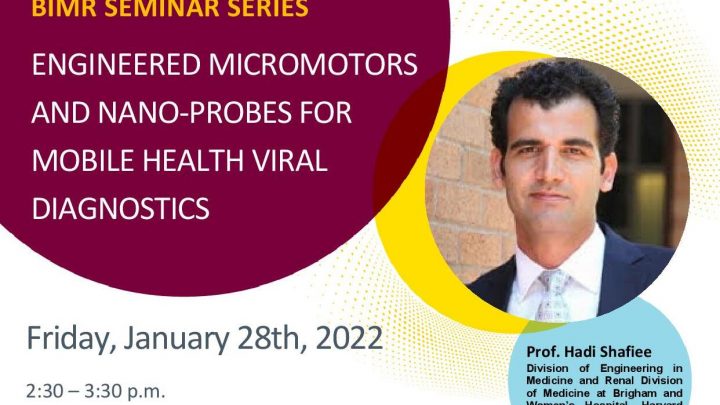ENGINEERED MICROMOTORS AND NANO-PROBES FOR MOBILE HEALTH VIRAL DIAGNOSTICS
Jan 28, 2022
2:30PM to 3:30PM

Date/Time
Date(s) - 28/01/2022
2:30 pm - 3:30 pm
Categories
The advancements in nanotechnologies, computer programming, and consumer electronics have allowed the development of mobile health diagnostics with applications in disease detection and treatment monitoring at the point-of-care.
Metal nanoprobes and self-propelling nanoparticles possess unique catalytic properties that can be utilized in the development of mobile health diagnostics by seamlessly integrating with the advancements in smartphone-based image processing and machine learning. Amongst the advantages of catalytically-powered nanomotors and nanoprobes are its simplicity in signal amplification, its stability over time, and easy integration with portable devices such as smartphones. We have developed multiple smartphone-based diagnostic systems by utilizing intrinsic catalytic properties of metal nanoparticles and on-phone deep learning-based image processing. Our unique approach of optical signal amplification through micro- or macro-sized gas bubble formation combined with accurate and rapid on-phone deep learning-based image processing allows the development of simple, low-cost virus detection using a smartphone camera with and without using any smartphone-based optical hardware attachment. We have been able to detect both intact viruses and nucleic acids in complex biological samples. In those scenarios where we targeted nucleic acids, we integrated loop-mediated isothermal amplification (LAMP) or clustered regularly interspaced short palindromic repeats (CRISPR) with our catalytically-powered nanomaterials for bright-field optical sensing.
We also employed adversarial neural networks with conditioning to enhance the adaptability of our platform technology for the detection of different viruses by leveraging a retrospective dataset of smartphone-taken microfluidic chip photos to create on-demand image classifiers for target pathogens. We have evaluated the performance of our developed catalytically-powered diagnostic systems with hundreds of patients samples with different viral infections such as HIV, HBV, HCV, ZIKV, and SARS-CoV-2.
Bio:
Dr. Shafiee graduated from Isfahan University of Technology, Iran (BSc) in 2001 and University of Tehran, Iran (MSc) in 2003 with degrees in Mechanical Engineering. He received his Ph.D. in Biomedical Engineering and Mechanics from Virginia Polytechnique Institute and State University in 2010. After receiving trainings in the development of devices for cell sorting and pathogen detection at Virginia Tech and Harvard-MIT Division of Health Science and Technology, he started his own lab at BWH, HMS in 2014. Dr. Shafiee’s lab strives to develop innovative diagnostic tools to address unmet clinical challenges through integrating biology/medicine, micro- and nanotechnology, consumer electronics, and artificial intelligence. His work has been recognized by some of the major news outlets including CNN, theguardian, Boston Globe, CBS News, STAT, New York Times, etc. He has mentored more than 60 postdoctoral research fellows, and undergraduate and graduate students.
Join Zoom Meeting:
https://mcmaster.zoom.us/j/99137467315?pwd=Y0FEMmdTZVNOWTdKMTFvVTd2cE5IUT09

